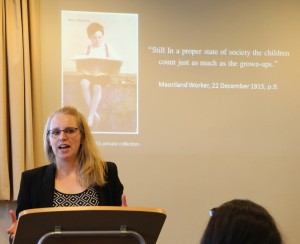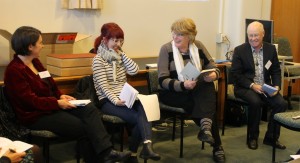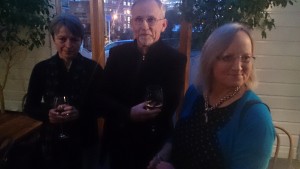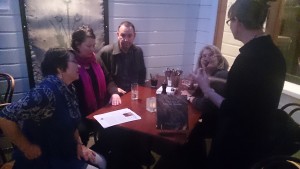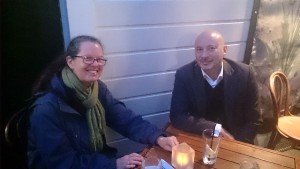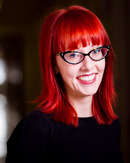New Publication on Indigenous Mobilities
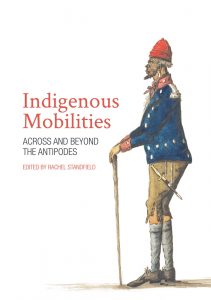 In November 2014, CROCC co-hosted the Indigenous Mobilities symposium at Otākou Marae. This event attracted a number of Australian historians as well as some CROCC scholars, looking at Māori and Aboriginal mobilities of the past. ANU Press, in conjunction with Aboriginal History, have published this research as Indigenous Mobilities: Across and Beyond the Antipodes. This edited collection can now be downloaded free in PDF or eBook form either in its entirety or as individual essays, including those of CROCC members, Tony Ballantyne, Angela Wanhalla and Lachy Paterson.
In November 2014, CROCC co-hosted the Indigenous Mobilities symposium at Otākou Marae. This event attracted a number of Australian historians as well as some CROCC scholars, looking at Māori and Aboriginal mobilities of the past. ANU Press, in conjunction with Aboriginal History, have published this research as Indigenous Mobilities: Across and Beyond the Antipodes. This edited collection can now be downloaded free in PDF or eBook form either in its entirety or as individual essays, including those of CROCC members, Tony Ballantyne, Angela Wanhalla and Lachy Paterson.
Successful Start to Global Dunedin
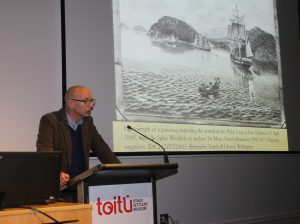 The first Global Dunedin programme at Toitū Otago Settlers Museum began with Centre Co-Director, Professor Tony Ballantyne, presenting on “The John Wickliffe, the Philip Laing and the Making of the Otago Colony”. Tony’s lecture was wide-ranging, taking us from the initial landing of the Free Church settlers, and their interactions with Kāi Tahu, right through to the 50th anniversary, where the the debate centred on who truly deserved to be included into the category of “early” settler.
The first Global Dunedin programme at Toitū Otago Settlers Museum began with Centre Co-Director, Professor Tony Ballantyne, presenting on “The John Wickliffe, the Philip Laing and the Making of the Otago Colony”. Tony’s lecture was wide-ranging, taking us from the initial landing of the Free Church settlers, and their interactions with Kāi Tahu, right through to the 50th anniversary, where the the debate centred on who truly deserved to be included into the category of “early” settler.
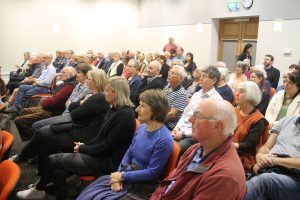 The Centre’s Global Otago programme brings engaging speakers to Toitū, who can place Dunedin in a global context, whether in the past, present or future. This lecture was a resounding success, with more seats having to be brought in to accommodate the crowd. Professor Charlotte Macdonald will be delivering the April lecture; details will be posted soon.
The Centre’s Global Otago programme brings engaging speakers to Toitū, who can place Dunedin in a global context, whether in the past, present or future. This lecture was a resounding success, with more seats having to be brought in to accommodate the crowd. Professor Charlotte Macdonald will be delivering the April lecture; details will be posted soon.
Centre Refunded
It is great news that the University of Otago has refunded the Centre for Research on Colonial Culture for a further five years, one of just twelve “flagship research centres”.
As Deputy Vice-Chancellor (Research and Enterprise) Professor Richard Blaikie noted, the University’s funding and other support of its flagship research centres and research themes is an important way of ensuring the internationally outstanding work of its researchers, across a wide range disciplines, is encouraged and nurtured. “We recognise that our researchers in these centres and themes are often world-leading in many areas and we are pleased to be able to back them to pursue excellence in their fields.”
The Centre now has two co-directors, Professor Tony Ballantyne and Associate Professor Angela Wanhalla. A number of events are planned over the coming years, about which information will be forthcoming soon.
CROCC Seminar: Ryan Tucker Jones
A Whale of a Difference
Changing Right Whale Culture and the Making of the Tasman World
The Centre is hosting Dr Ryan Tucker Jones of the University of Auckland who will be presenting a seminar on Tasman whaling history in relation to British encounters with Māori and Australian Aborigines.
This will be held: 11am-12.30pm, Tuesday 29 November, History Seminar Room (Burns 2N8). Please feel free to come.
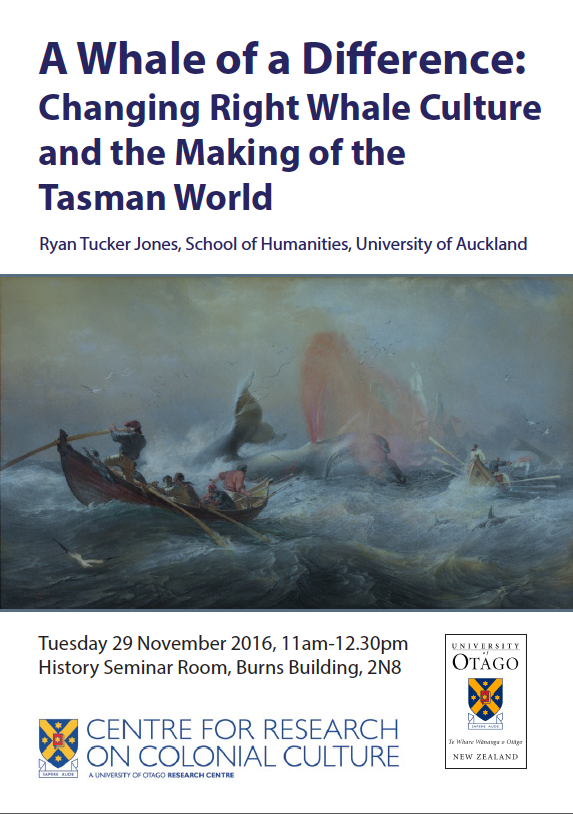 Abstract: “This paper examines the impact that changing right whale cultures had on cross-cultural encounters between British colonists, Aboriginal peoples, and Māori in Australia and New Zealand during the era of bay whaling, c.1805-1850. I argue that historians must take seriously the ways that environments (especially living environments) change in order to understand colonial and indigenous histories, and that comparative histories across the Tasman offers an ideal way to think through and document this history.”
Abstract: “This paper examines the impact that changing right whale cultures had on cross-cultural encounters between British colonists, Aboriginal peoples, and Māori in Australia and New Zealand during the era of bay whaling, c.1805-1850. I argue that historians must take seriously the ways that environments (especially living environments) change in order to understand colonial and indigenous histories, and that comparative histories across the Tasman offers an ideal way to think through and document this history.”
Launch of New Book on New Zealand’s Overseas Missions
Come along to help launch and celebrate Dr Hugh Morrison’s new book, Pushing the Boundaries: New Zealand Protestants and Overseas Missions, 1827-1939, at the University Book Shop (Great King Street), Friday 8th April, at 5.30pm.
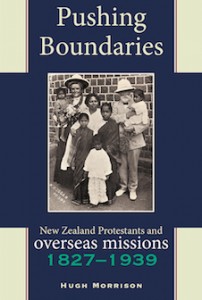 Published by Otago University Press, “Pushing Boundaries is the first book-length attempt to tell the story of the evolution of overseas missionary activity by New Zealand’s Protestant churches from the early nineteenth century up to World War II. In this thought-provoking book, Hugh Morrison outlines how and why missions became important to colonial churches – the theological and social reasons churches supported missions, how their ideas were shaped, and what motivated individual New Zealanders to leave these shores to devote their lives elsewhere.
Published by Otago University Press, “Pushing Boundaries is the first book-length attempt to tell the story of the evolution of overseas missionary activity by New Zealand’s Protestant churches from the early nineteenth century up to World War II. In this thought-provoking book, Hugh Morrison outlines how and why missions became important to colonial churches – the theological and social reasons churches supported missions, how their ideas were shaped, and what motivated individual New Zealanders to leave these shores to devote their lives elsewhere.
“Secondly, he connects this local story to some larger historical themes – of gender, culture, empire, childhood and education. This book argues that understanding the overseas missionary activity of Protestant churches and groups can contribute to a more general understanding of how New Zealand has developed as a society and nation.”
Hugh is a historian of missiology, a member of the Centre for Research on Colonial Culture, and a staff member at the College of Education, University of Otago.
Ballantyne wins W H Oliver prize
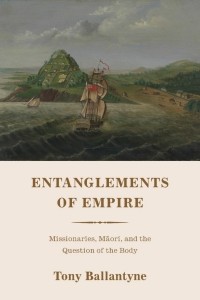 Congratulations to Centre director, Professor Tony Ballantyne, for winning the W.H. Oliver prize. This was the first time the prize has been awarded, for the best recent book on any aspect of New Zealand history. Tony’s book, Entanglements of Empire: Missionaries, Māori, and the Question of the Body, published by Auckland University Press, was the winning entry, announced yesterday at the New Zealand Historical Association conference in Christchurch. The books of two other CROCC members, Tom Brooking’s Richard Seddon: King of God’s Own and Angela Wanhalla’s Matters of the heart: A History of Interracial Marriage in New Zealand were shortlisted, as was that of Melissa Matutina Williams, Panguru and the City: Kāinga Tahi, Kāinga Rua.
Congratulations to Centre director, Professor Tony Ballantyne, for winning the W.H. Oliver prize. This was the first time the prize has been awarded, for the best recent book on any aspect of New Zealand history. Tony’s book, Entanglements of Empire: Missionaries, Māori, and the Question of the Body, published by Auckland University Press, was the winning entry, announced yesterday at the New Zealand Historical Association conference in Christchurch. The books of two other CROCC members, Tom Brooking’s Richard Seddon: King of God’s Own and Angela Wanhalla’s Matters of the heart: A History of Interracial Marriage in New Zealand were shortlisted, as was that of Melissa Matutina Williams, Panguru and the City: Kāinga Tahi, Kāinga Rua.
.
The Canadian Invasion.
It seemed like Dunedin had been invaded by Canadian academics at recent Centre events.
The first event was a half-day symposium, “Colonial Families: New Perspectives” on 20 August, organized by Angela Wanhalla and also funded through her Royal Society Rutherford Fellowship. This featured Laura Ishiguro (University of British Columbia), with ‘“Say nothing”: gossip, intimation, and the limits of intimacy in a colonial family’, a paper that investigated the mixed-race David-Phillipps family, and the gossip and silences around the marriage and children. Jennifer Ashton (Auckland), spoke on ‘Respectability and the Half-caste: The Russells and Manings in 19th Century Hokianga’, on the efforts of early elite Pākehā males for their mixed-race children to gain the cultural capital necessary to become respectable in the emerging settler society. Crystal Fraser (University of Alberta) gave a paper on ‘Reconciling the Future: Past and Present Understandings of Gwich’in Families in the Northwest Territories, Canada’ which looked at her own family’s history living in the “two worlds” of Indigenous and “modern” Canada. Erica Newman (University of Otago) finished this session with the paper ‘The Care of Fiji’s Orphan’s During the Colonial Period, 1874-1970’ looking at guardianship, adoption and orphanages in colonial Fiji, with particular emphasis on Fijian Indian children.
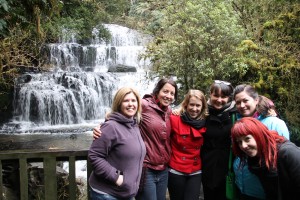
Canadian guests at the Pūrākaunui Falls, in the Catlins, with members of Otago’s History programme, on the weekend. From left: Angela Wanhalla, Jane McCabe, Kate Stevens, Laura Ishiguro, Crystal Fraser and Kristine Alexander.
On 24 and 25 August the two-day symposium, ‘”Unpicking the Tapestry”: Children and Young People in British Colonial Contexts’ was held at the Hocken Collections. CROCC member, Hugh Morrison, gathered a great range of scholars to look at colonial children’s history. This began with a mihi whakatau (welcome) from Mark Brunton, Māori Research Officer (Office of Māori Development, University of Otago).
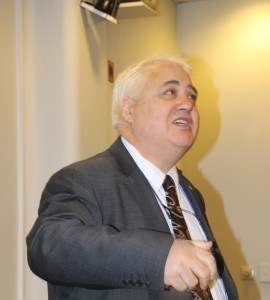
Kei te mihi atu a Mark Brunton (Ngāi Tahu) ki ngā tāngata i tae mai ki te hui rangahau. Mark Brunton (Ngāi Tahu) greeting the symposium attendees.
The first day’s talks were as follows: Crystal Fraser (University of Alberta) ‘”We went through hell together me and my friend; we cried together, we got shit together, and we fought together”: Student Life at Hostels in Northern Canada, 1950s to 1980s’; Chris Brickell (University of Otago) ‘Transport, Modernity and the Making of Adolescent Cultures’;
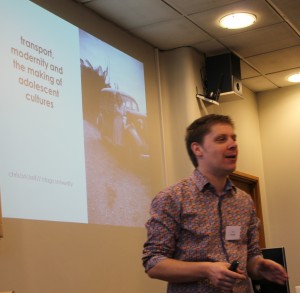
Chris Brickell spoke about how modes of colonial transport operated as cultural spaces for New Zealand adolescents.
Susan Cahill (Concordia University) ‘Where in the Girl’s Realm are the Irish?: Representations of Irish Girlhood in British Girls’ Periodicals 1880-1914′; Michelle Smith (Deakin University) ‘The Family and Maternal Feminism in Colonial Girls’ Literature’; Helen May (University of Otago) ‘Froebel’s “New Child” in the “New World” Colony: Transforming the Kindergarten across Cultures and Continents’; Christina Ergler (University of Otago) ‘Managed Childhoods? Questioning the notion of Urban Children’s Free play in Aotearoa over the Course of History’. Kristine Alexander (Canada Research Chair in Child and Youth Studies, University of Lethbridge) closed off the first day with an evening public lecture, ‘A Tangled Web: Children, Colonialism and Archives’ looking at how the presence of children is marginalized within the Archives.
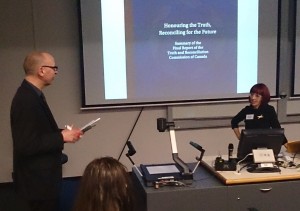
CROCC Director, Tony Ballantyne, who chaired the evening keynote, poses a question to Kristine Alexander.
The second day’s lineup included Lynette Townsend (Te Papa) ‘Child-made Material Culture: an Assemblage of Colonial History’; Jane McCabe (University of Otago) ‘From “Grandmama’s” to “Up the Hill”: Three Childhoods in One Empire Family; Hugh Morrison (University of Otago) ‘Children and Missions: Shifting Identities and Colonial Spaces’; Laura Ishiguro (University of British Columbia) ‘”The future of this country will depend on our children and children’s children”: the Aspirational Politics of Settler Futurity in Colonial British Columbia’; Bettina Bradbury (Victoria University (NZ) and York University) ‘”I don’t think I was ever a boy’: Edward Kearney Junior’s Memoir, Emotion, Memory and Colonial Childhood’;
Anna Gilderdale (University of Auckland) ‘”Sunbeams”, “Cousins” and “Little Folk”: Constructing Young Folks’ Social Worlds through Print, 1880-1920′; Kristine Moruzi (Deakin University) ‘Colonial Children and Charity’. The event closed with a panel discussion headed by Kristine Alexander, Helen May, Kristine Moruzi and Hugh Morrison.
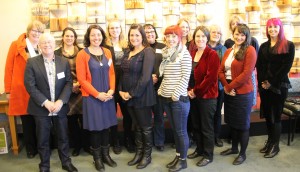
Click to enlarge. Presenters (mostly), from left: Helen May, Hugh Morrison, Christine Ergler, Jane McCabe, Anna Gilderdale, Crystal Fraser, Angela Findlay, Kristine Alexander, Susan Cahill, Kristine Moruzi, Bettina Bradbury, Laura Ishiguro, Lynette Townsend, and Michelle Smith.
Extra Media options: Dunedin TV (the local station) broadcast a two-minute television clip on the “Unpicking the Tapestry” symposium, with short cameos from a few of the presenters. Click here to view.
This was also the first time we have actively used Twitter at a CROCC event, with Angela Wanhalla (and a few others) disseminating regular tweets of snippets of presentations, and the odd photo, as the symposium progressed. These can be accessed on Twitter through #cyccs. Angela has also created a Storify package where the tweets have been collected together, and can be seen without having to have a Twitter account. Click here to access.
Thanks to Hugh and Angela for organizing these two amazing events, and to all the scholars (from Canada, Australia and New Zealand) who made their way to Dunedin to share their research.
Wellington celebration
The Centre would like to thank Professor Charlotte Macdonald who organized a celebration for The Lives of Colonial Objects on Monday evening at the Thistle Inn in Wellington.
Folk from the capital (from VUW, Te Papa, and others) are well represented in the book, and it was a great opportunity to come together, along with friends and colleagues. Two of the co-editors, Annabel Cooper and Lachy Paterson, were able to attend from Dunedin. He mihi nunui, Charlotte, for your passion and your hospitality.
An exciting symposium on colonial childhood
The Centre for Research on Colonial Culture is hosting a free two-day symposium, ‘Unpicking the tapestry: children and young people in British colonial contexts’, comprising 16 different papers on this theme by a range of scholars from New Zealand, Australia, Canada, and the USA, and with roundtable discussions to end each day’s sessions. This will be held in the Seminar Room, Hocken Collections, 24-25 August. Click here for the Draft Programme.
As part of this event, Dr Kristine Alexander of Leithbridge University, a Canada Research Chair in Child and Youth Studies, will be giving a public lecture, “A Tangled Web: Childhood, Colonialism, and Archives”. This will be be held in Burns 2, 24 August at 5.30pm. All interested people are warmly invited.
In particular the symposium is interested in addressing a number of key questions which include: What does it mean to talk about ‘colonial childhoods or adolescence’ or to think about children and young people in relation to colonialism? What colonial sites were significant or influential for children’s and young people’s lives, and in what colonial sites were children influential? To what extent were children and young people constrained by boundaries or moved fluidly across boundaries (eg. gender, race or ethnicity, nation, class, religion), and to what effect? What are the sources for excavating and interpreting colonial childhoods? What are the gaps and silences? How do we negotiate these? In what ways might a comparative approach (across colonial societies) expand or limit our understanding of colonial childhoods and adolescence? What are the significant challenges and opportunities in this field of academic enquiry?
If you are interested in attending the symposium, please contact hugh.morrison@otago.ac.nz by the end of the month.

